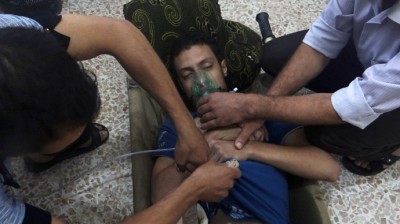Saudi Black Op Team Behind Damascus Chemical Weapons Attack – Diplomatic Sources

A man, affected by what activists say is nerve gas, breathes through an oxygen mask in the Damascus suburbs August 21, 2013 (Reuters/Ammar Dar)
The August chemical weapons attack in the Syrian capital’s suburbs was done by a Saudi Arabian black operations team, Russian diplomatic sources have told a Russian news agency.
“Based on data from a number of sources a picture can be pieced together. The criminal provocation in Eastern Ghouta was done by a black op team that the Saudi’s sent through Jordan and which acted with support of the Liwa Al-Islam group,” a source in the diplomatic circles told Interfax.
The attack and its consequences had a huge impact on the Syrian situation, another source said.
“Syrians of various political views, including some opposition fighters, are seeking to inform diplomats and members of international organizations working in Syria what they know about the crime and the forces which inspired it,” he told the agency.
Liwa Al-Islam is an Islamist armed group operating near Damascus headed by the son of a Saudi-based Salafi cleric. The group claimed responsibility for the bombing of a secret governmental meeting in Damascus in July 2012 that killed a number of top Syrian officials, including Defense Minister Dawoud Rajiha, his deputy Asef Shawkat, and Assistant Vice President Hassan Turkmani.
The allegations mirror a number of earlier reports, which pointed to Saudi Arabia as the mastermind behind the sarin gas attack, which almost led to US military action against Syrian government. Proponents of this scenario say intelligence services in Riyadh needed a false flag operation to provoke an American attack in Syria, which would tip the balance in favor of the armed opposition supported by Saudi Arabia.
While the majority of Western countries say they are certain that the Syrian government carries the blame for the attack, Damascus maintains that the rebel forces must be behind it. Russia shares this conviction too, calling the incident a provocation.
Back in March US President Barack Obama said the use of chemical weapons would be a ‘red line’ for the Syrian government, crossing which would prompt America’s intervention into the bloody Syrian conflict. After the August attack, which the US believes has claimed some 1,400 lives, the president was called on his words by many supporters of the Syrian opposition both at home and outside of the US.
The plan for military action was put on pause after a Russia-brokered deal with Damascus, which agreed to join the Organization for the Prohibition of Chemical Weapons (OPCW) and destroy its stockpile of chemical weapons. Experts from OPCW are currently in Syria preparing for the disarmament.
Back in March, US President Barack Obama said the use of chemical weapons would be a ‘red line’ for the Syrian government, crossing which would prompt America’s intervention in the bloody Syrian conflict. After the August attack, which the US believes has claimed some 1,400 lives, the president was called to act on his words by many supporters of the Syrian opposition both at home and outside the US.
Earlier a UN report concluded that nerve gas had indeed been used “on a large scale” in August. However, the consistency of the findings is under question.
According to the report, none of the environmental samples the UN collected in Western Ghouta tested positive for Sarin, while biomedical samples, taken from affected people, all tested positive.
RT’s Worlds Apart host Oksana Boyko has spoken to Angela Kane, UN high representative for disarmament affairs, who has just returned from Damascus.
“If you read the report, the report comes out and says sarin was used. It is also a matter that maybe in the environmental samples they took there was no sarin found, but that does not mean that sarin was not used,” Kane told Worlds Apart. “It was there in the human samples. If they had more time to go around they would have found different samples. It was a limited collection that they did, but the collection was conclusive. I think, it was very comprehensive, therefore, we shared all of those samples with the Syrian government.”
At the same time, there have been concerns voiced that witnesses the UN team spoke to were brought by the opposition from different regions and did not live in Western Ghouta.
“I think it is not possible to say ‘We brought them all from a different area.’ To my mind that is inconceivable. You can come up with the theory, but this does not mean the theory is correct,” Kane said.

